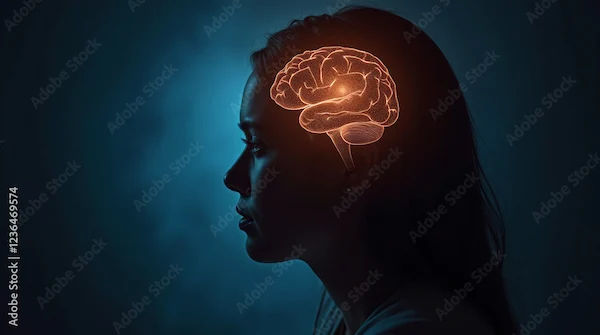Mental Health Impact On Well-Being
Discover how mental health affects overall well-being. Understand the connection between mental health and physical, emotional, and social wellness for a balanced life.

Written by Dr.Sonia Bhatt
Last updated on 3rd Jul, 2025

Mental health is a fundamental component of overall well-being, shaping an individual’s thoughts, emotions, and interactions with the world. It influences how people process information, handle emotions, respond to challenges, and build relationships. A healthy mental state enables individuals to manage stress effectively, make sound decisions, and maintain a positive outlook on life.
From early childhood to adulthood, mental well-being plays a crucial role in personal growth, resilience, and quality of life. Just like physical health, it requires attention, care, and support to ensure a balanced and fulfilling life. Understanding and prioritising mental health can lead to greater emotional stability, improved social connections, and overall happiness. In this blog we will learn about mental health and its impact on well-being.
Relationship Between Mental Health and Well-Being
Mental health is a fundamental component of overall well-being, directly influencing a person’s quality of life and ability to function effectively. It encompasses not just the absence of mental illness but a spectrum of emotions, resilience, and coping mechanisms that contribute to a fulfilling and balanced life. Essentially, good mental health fosters well-being, while poor mental health can significantly hinder it.
1. Impact on Daily Life
Good mental health helps individuals:
Build strong personal and professional relationships.
Work productively and make sound decisions.
Contribute positively to their communities.
Maintain motivation, self-confidence, and resilience.
2. Negative Effects of Poor Mental Health
Poor mental health can lead to:
Anxiety, depression, and mood swings.
Difficulty in focusing and making decisions.
Struggles in maintaining relationships and achieving goals.
Reduced motivation and life satisfaction.
Common Mental Health Issues Affecting Well-Being
The common mental health issues affecting well-being are as follows:
1. Depression
Depression affects well-being in the following ways:
Characterised by persistent low mood, loss of interest, and a lack of positive emotions.
Symptoms include sadness, fatigue, irritability, social withdrawal, and physical discomfort.
Cognitive effects include poor concentration, negative thoughts, and rumination.
Can lead to sleep disturbances, appetite changes, low self-esteem, feelings of guilt, and suicidal thoughts.
2. Generalised Anxiety Disorder (GAD)
Generalised anxiety disorder affects well-being in the following ways:
Persistent, excessive worry about everyday situations for at least six months.
Symptoms include restlessness, fatigue, difficulty concentrating, irritability, muscle tension, and sleep disturbances.
Can lead to excessive concerns about health, relationships, or routine activities.
Often comorbid with depression, making diagnosis challenging.
3. Panic Disorder
Panic disorder affects well-being in the following ways:
Sudden, intense panic attacks with overwhelming fear or distress.
Can be triggered by specific situations (external) or occur spontaneously (internal).
Symptoms include heart palpitations, shortness of breath, dizziness, and sweating.
Often leads to avoidance behaviors and, in severe cases, agoraphobia.
4. Obsessive-Compulsive Disorder (OCD)
Obsessive-compulsive disorder affects well-being in the following ways:
Characterised by unwanted, intrusive thoughts (obsessions) and repetitive behaviors (compulsions).
Common obsessions: fear of contamination, harm, symmetry, or intrusive thoughts.
Common compulsions: excessive checking, cleaning, counting, or mental rituals.
Causes significant distress and interference with daily life.
5. Post-Traumatic Stress Disorder (PTSD)
Post-traumatic stress disorder affects well-being in the following ways:
Develops after exposure to traumatic events such as violence, accidents, or disasters.
Symptoms include flashbacks, nightmares, intrusive thoughts, and emotional numbness.
Can lead to hypervigilance, sleep disturbances, irritability, and avoidance of trauma reminders.
Often affects survivors of war, abuse, life-threatening illnesses, and emergency personnel.
6. Social Anxiety Disorder
Social anxiety disorder affects well-being in the following ways:
Intense fear of social situations due to fear of judgment or embarrassment.
Leads to avoidance of social interactions, impacting education and career.
Symptoms include blushing, sweating, trembling, nausea, and panic attacks.
Can result in depression, substance abuse, or comorbid anxiety disorders.
Effects of Poor Mental Health on Physical Health
The effects of poor mental health on physical health are as follows:
1. Increased Risk of Chronic Diseases
Depression is linked to conditions like diabetes, asthma, cancer, cardiovascular disease, and arthritis.
Schizophrenia is associated with a higher risk of heart and respiratory diseases.
Mental health conditions can worsen chronic illness management and increase mortality rates.
2. Sleep Disorders
Mental health conditions often lead to insomnia and sleep apnea.
Sleep disturbances can worsen conditions like depression, anxiety, and bipolar disorder.
3. Higher Smoking Rates
People with mental health conditions are more likely to smoke and consume more cigarettes.
Nicotine temporarily boosts dopamine levels, offering short-term relief from depression.
Increased smoking leads to higher addiction risks and health complications.
4. Limited Access to Healthcare
People with mental health conditions may struggle to seek medical care or adhere to treatments.
Difficulty in maintaining physical health, regular medication use, and exercise.
Impact on Social Relationships
Key ways mental health affects social relationships:
Social Withdrawal: Depression and anxiety can lead to isolation, distancing individuals from their support network.
Communication Difficulties: Mental health issues can impair expression, listening, and conflict resolution, causing misunderstandings.
Mood Swings & Irritability: Conditions like bipolar disorder can lead to unpredictable mood changes, straining relationships.
Low Self-Esteem: Mental struggles lower self-worth, making it hard to form or maintain relationships.
Relationship Conflict: Symptoms like paranoia or jealousy can create tension and unnecessary conflicts.
Difficulty Maintaining Social Roles: Mental health issues can make it challenging to be a reliable friend, partner, or family member.
Mental Health in Different Life Stages
Mental health in different stages of life are as follows:
1. Mental Health in Children and Adolescents
Early emotional development influences future well-being.
Common issues: anxiety, ADHD, depression, and peer pressure.
2. Adult Mental Health Concerns
Stress from work, finances, and relationships impacts mental health.
Anxiety, depression, and burnout are prevalent concerns.
3. Mental Health in the Elderly
Higher risk of loneliness and social isolation.
Cognitive decline, dementia, and depression are common.
Coping Strategies and Treatments
The following are the coping strategies and treatment for mental health:
1. Psychotherapy and Counseling
The psychotherapy and counseling includes:
Psychotherapy helps individuals work through challenges, manage symptoms, and improve coping strategies.
Cognitive Behavioral Therapy (CBT) focuses on changing negative thought patterns and behaviors.
Counseling can be one-on-one or in a group setting, guided by a trained mental health professional.
2. Medication Management
Medication management includes:
Medications such as antidepressants and antipsychotics can help reduce symptoms by balancing brain chemicals.
It's crucial to follow the healthcare provider’s instructions and never stop medication without consultation.
3. Lifestyle Changes and Self-Care Practices
Lifestyle changes and self-care practices are as follows:
Alternative therapies like yoga, meditation, acupuncture, and herbal remedies can complement treatment but should be discussed with a healthcare provider.
Regular physical activity, a balanced diet, and healthy sleep habits can support overall well-being and mental health.
Role of Support Systems
The role of support systems are as follows:
1. Family and Friends Support
Family and friends provide emotional support, practical help, and a sense of belonging.
Family often plays a key role in supporting individuals with serious mental illness.
Encouraging self-care practices like exercise, healthy eating, and proper sleep can benefit those with mental health issues.
2. Community Resources and Mental Health Services
Community-based services, self-help groups, and crisis centers offer vital support.
Support groups reduce isolation and help individuals develop coping strategies.
Importance of Mental Health Awareness
The importance of mental health awareness are as follows:
Reduces Stigma: Raising mental health awareness helps people recognize that mental health conditions are common and not shameful.
Encourages Help-Seeking: Awareness empowers individuals to recognize when they or others may need support, encouraging them to seek help.
Improves Support: Increased awareness helps people better understand how to offer support to loved ones dealing with mental health challenges.
Conclusion
Mental health is crucial to overall well-being, impacting daily functioning, physical health, and social relationships. By prioritising mental health through effective treatments, coping strategies, and strong support systems, individuals can improve their quality of life and resilience. Mental health awareness helps reduce stigma, encourages help-seeking, and fosters better support. Taking care of mental health is essential for a fulfilling life, enabling individuals to thrive personally and socially.
Consult Top Psychiatrist
Consult Top Psychiatrist

Dr. Dinesh Reddy Panati
Psychiatrist
13 Years • MBBS, MD (Psychiatry)
Visakhapatnam
Apollo 24|7 Clinic - Andhra Pradesh, Visakhapatnam

Dr. Vunnam Shashanka
Psychiatrist
9 Years • MBBS, MD (Psychiatry)
Visakhapatnam
Apollo 24|7 Clinic - Andhra Pradesh, Visakhapatnam
(150+ Patients)

Dr. Seema Jain
Psychiatrist
31 Years • MBBS, DPM, DNB ( Psychiatry)
Nashik
Apollo 24|7 Clinic - Maharashtra, Nashik
(50+ Patients)
Dr. Krishna Sahithi J
Psychiatrist
11 Years • MBBS, MD (Psychiatry), FIPS
Hyderabad
Feronia Super Speciality Clinics, Hyderabad

Dr. Pratik Kumar
Psychiatrist
10 Years • MBBS,DNB-PSYCHIATRY
North West Delhi
DELHI GLOBAL MIND CLINIC, North West Delhi
(75+ Patients)




